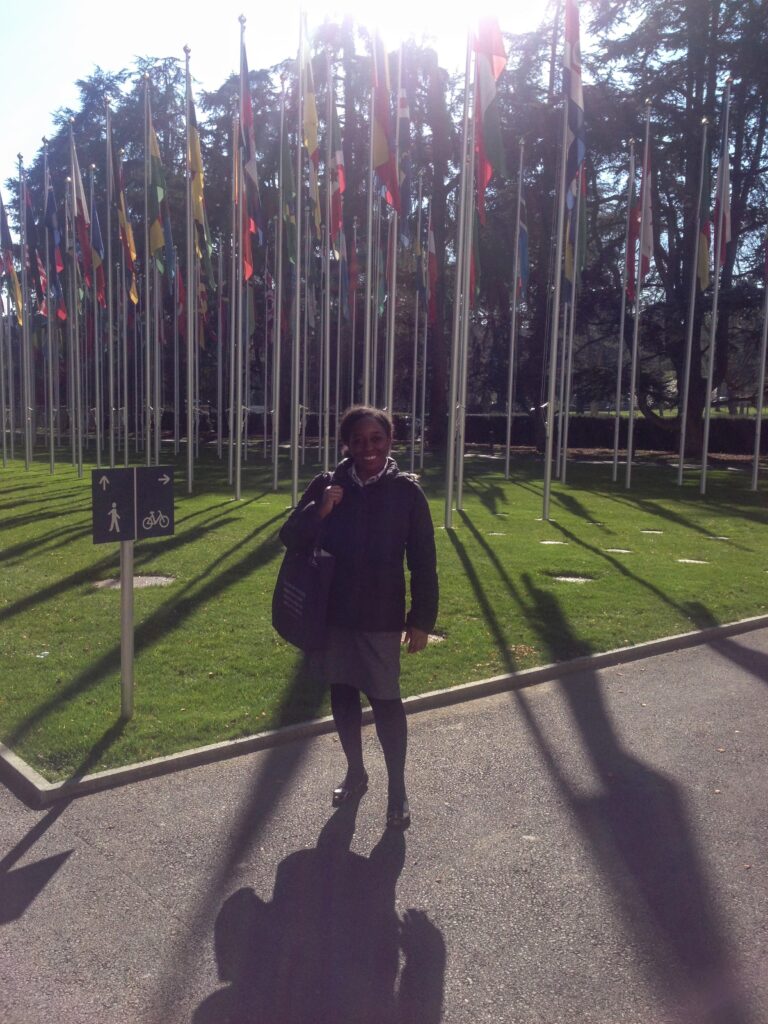Aminta Ossom, J.D. ’09, is a Clinical Instructor and Lecturer on Law. Immediately prior to joining the Clinic in 2019, she served as a human rights officer at the United Nations, where she supported the Subcommittee on Prevention of Torture and the Special Rapporteurs of the Human Rights Council. During summer 2022, she took a professional development leave, returning to the UN as it launched the Permanent Forum on People of African Descent. Aminta supported the Permanent Forum as it prepared for its first session, which was held in Geneva in early December.
What is the Permanent Forum on People of African Descent?
The Permanent Forum on People of African Descent is a United Nations mechanism established by the UN General Assembly in 2021. According to the GA resolution that sets out its mandate, the Permanent Forum serves as “a consultative mechanism for people of African descent and other relevant stakeholders” and as “a platform for improving the safety and quality of life and livelihoods of people of African descent.” There is often confusion about whether this means that the Permanent Forum is a convening or a human rights body. In fact, it’s both.
In practice, the Permanent Forum has two overarching goals. One is to provide advice to the Human Rights Council—and the UN as a whole—on measures that would advance the human rights of people of African descent. The other is to convene organizations and individuals working to improve the lives of people of African descent worldwide.
There are ten individuals selected by the General Assembly and the Human Rights Council to be members of the Permanent Forum. Members have significant responsibilities, such as consulting with governments, UN agencies, and community organizations on the Forum’s agenda. Members also lead discussions at Permanent Forum sessions and share their expertise on the human rights of people African descent in international dialogues. They are the core of the mechanism.

What did your work entail over the summer?
This past summer, I returned to being a UN staff member, which was the role I had before joining the International Human Rights Clinic in 2019. As a part of the UN Secretariat, I was one of the institutional aides to the Forum’s ten independent members and I supported them as they planned for the inaugural session.
Secretariats are generally the first point of contact for anyone interacting with a UN mechanism. They are in constant communication with government representatives, civil society members, and other UN staff and are regularly thinking about the institutional needs of the mechanism. How could we help the body deliberate on a program? How could we facilitate the broadest possible participation in the session? What about the room, the media, the interpretation? You do everything from coordinating logistics to assisting with public statements and following consultative processes.
My time in Geneva ended before the session took place, but I learned a ton. And I will also forever have respect for the team “behind the scenes,” so to speak.
Can you tell us a bit about the first session this past December?
The Permanent Forum’s first session was truly a highlight of my year. It was really inspirational to see an idea that so many people had advocated and worked for come to fruition. (A sister forum on indigenous issues was established 20 years ago, when I was still a high schooler!)
The event opened with a speech from Vice President Francia Márquez of Colombia, closed with performances by La Escuelita Del Ritmo and Ubufakazi Besoweto, and featured 35 side events highlighting how litigators, educators, filmmakers and others were combating discrimination. In the end, 900 people participated in the Forum, with 600 participating in-person and 300 online.
In terms of substance, the agenda of the first session included debates on systemic racism, climate justice, and reparatory justice. The Permanent Forum members also discussed the mandate that they have to give advice during the drafting of a declaration on the human rights of people of African descent.
From the participants, there was strong interest in issues of migration, land rights, and young people of African descent. I can imagine debates on those topics in future sessions.
How do you see human rights clinics like ours interacting with the Permanent Forum?
I see a lot of opportunity for human rights clinics to contribute to the work of the Permanent Forum. First, as members of civil society, clinics are engaging every day with the issues affecting people of African descent. The Permanent Forum should be hearing from us on issues like environmental racism, police brutality, reparatory justice, migrants’ rights, and other important topics. We can suggest agenda items for the sessions and community leaders that the Permanent Forum should consult. We can also propose recommendations that the Permanent Forum could make to governments, the Human Rights Council, and other actors in the international community.
I also see clinical teams attending the Permanent Forum sessions in the future, and contributing to the programs of those sessions. (Civil society organizations can suggest speakers, organize the non-plenary events, and identify cultural opportunities that would connect the event to the communities represented.) Its sessions are not unlike the Business & Human Rights Forum, where hundreds of participants come to share advocacy goals, strategies, and new developments.
Having so many people who care about these issues in one place is just so powerful. And it’s practical. One of the goals of my travel to the session in December was to get ideas for clinical advocacy projects that would both benefit our students and communities looking to advance racial justice in the United States. I definitely came away with new potential collaborators and great ideas, in addition to simply feeling inspired and hopeful.